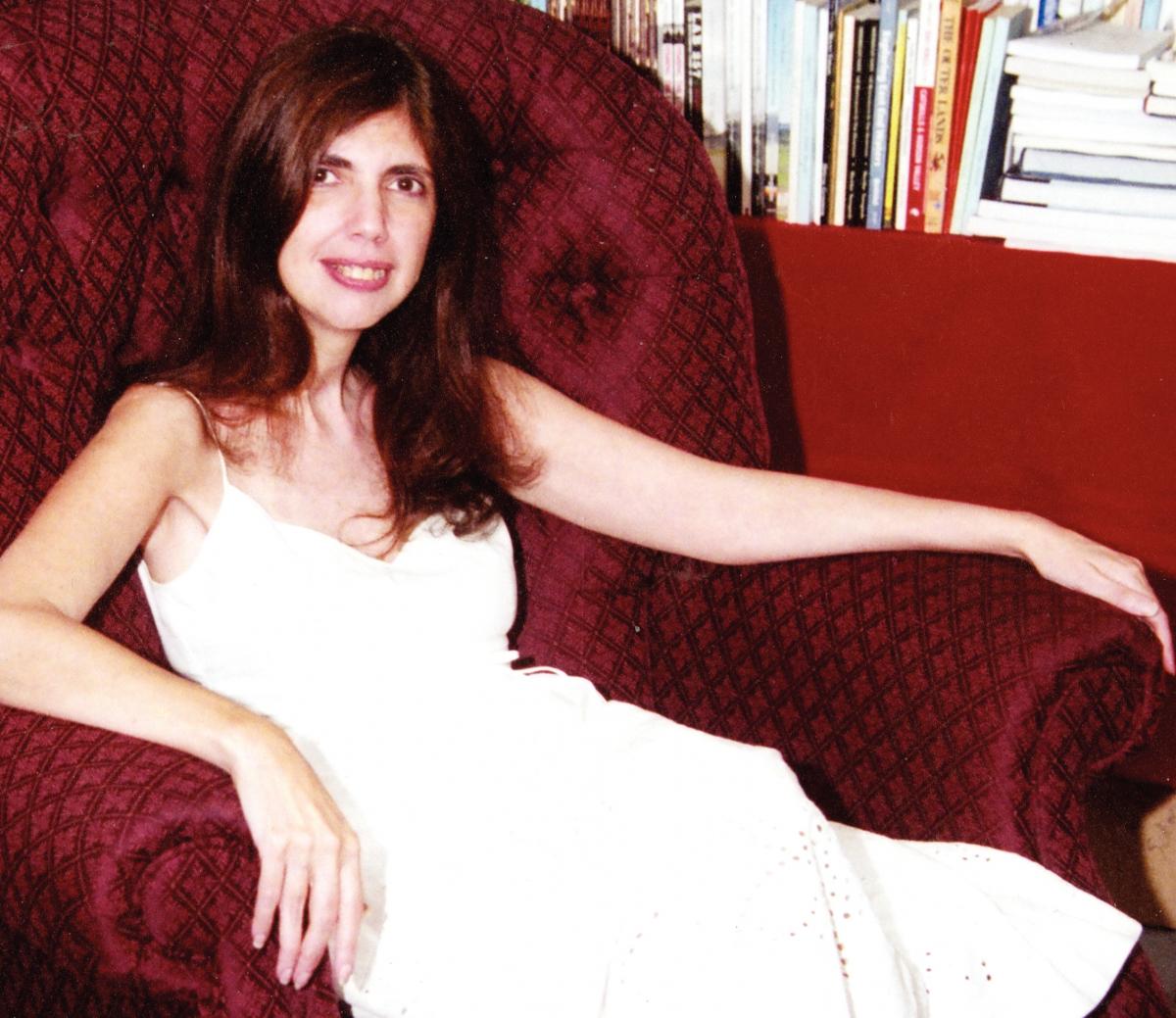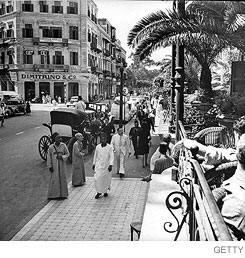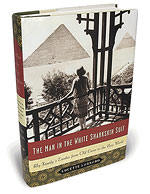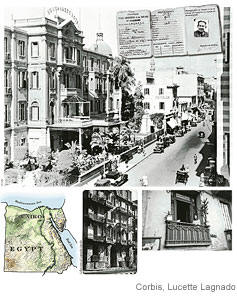Searching for My Father's Lost City
Before we fled, Cairo was a cosmopolitan crossroads. How much still remains?
 By LUCETTE LAGNADO
By LUCETTE LAGNADO
June 30, 2007 ; Page A1
http://online.wsj.com/article/SB118316659632153772.html?mod=googlenews_wsj
Cairo
As my car pulled into Suleiman Pasha Square in the heart of downtown Cairo, I spotted it immediately -- Groppi's, the patisserie that was really so much more: A palace of pleasure, the hub of elegant European social life, the city at its most vibrant and cosmopolitan. It seemed exactly as I remembered it when I'd last seen it as a little girl more than 40 years earlier, its name in that charming old-fashioned scrawl, the entrance covered by colorful mosaics and, inside, the same cool, high-ceilinged, marble elegance and pale pink walls.
Or maybe not the same.

The shelves were almost bare. No one stood in line at the ancient cash register. The few trays of pastries, which seemed neither French nor Middle Eastern, looked thoroughly unappetizing. The dining area had dozens of tables and almost no diners.
I was only six when my family left Egypt in 1963, among tens of thousands of Jews forced to leave in a modern-day exodus. After we fled, first to Paris then New York, I grew up on a diet of stories about our lost life. Many featured Groppi's: Part pastry-shop, part paradise, a favorite of kings, colonialists and privileged Cairenes.
Now, Groppi's was like the rest of Cairo -- a museum to a bygone era. These days, Egypt is a pivotal U.S. ally, essential in the war on terrorism and al Qaeda, and the second largest recipient of U.S. foreign aid. But it is also the faded grande dame of the Arab world -- a major power center, but in many respects a lesser power than it once was, overtaken politically by far wealthier Saudi Arabia and economically by other Gulf states. Once safely under the tutelage of the British, it has been through convulsive changes that reflects the turmoil that has swept the region over the past half century -- the rise of a bitterly anti-West military dictatorship led by the Nasser regime, the assassination of President Anwar Sadat after he made peace with Israel, the simmering danger of Islamic extremists that has prompted government crackdowns and a move away from democracy.
Economically, the decline relative to other countries has been steep. In 1950, prior to the revolution, Egypt's per capita income was 80% that of Greece's and 45% of Italy's; now, says Patrick Clawson, deputy director for research at the Washington Institute for Near East Policy, a nonprofit think tank, Egypt has 11% of Greece's per capita income, and 6% of Italy's.
These days, Egypt's per capita income is a slender $1,320 -- compared to more than $40,000 in Dubai. Politically, Egypt no longer enjoys the clout it had once upon a time when it was the political leader of the Arab world. While Cairo is certainly a major player, the Saudis are more likely to lead the way as Middle East peace brokers.
Egypt's efforts to chart an economic and political course separate from old colonial powers was important, many Egyptians believe, for the country to purge itself of foreigners whose influence and power were seen as oppressive. It was necessary for the country to pursue its own destiny. But it also left the country in some ways a shadow of its former self -- a country of lost splendor and faded splendor that has never been able to recover.
My father, who had lived in Egypt since the turn of the century, had been a prosperous businessman and pleasure seeker who gambled with King Farouk. My mother was a teacher and librarian in a private school supported by a Pasha and his wife. I attended the tony Lycée Français du Caire where at five, I wore a grey uniform with a crest. We left a year later, when my father, who had tried to hold on, succumbed to pressure from my older siblings who felt there was no future for them in Egypt.
Sadly, reluctantly, Dad gave away the lease to our apartment and signed papers known as aller sans retour. It meant that we were leaving and never coming back.
It was a wrenching departure, and we never got over it. No matter where we went we always looked back on Egypt with longing. "Ragaouna Masr," my dad would cry out in Arabic, especially as he fell on hard times in America. Colloquially, it meant "Take us back to Cairo!"
 My father died in 1993, having never returned to Egypt. Recently, I returned to Cairo.
In Egypt, the Jews' departure went hand in hand with the ouster of foreigners who had settled years earlier and turned Cairo into a capital of all-night cafes and open-air cinemas, where it was possible to hear people conversing in four or five languages -- French, English, Italian, Greek, Arabic -- in the same breath. According to Khairi Abaza, a senior fellow at the Foundation for the Defense of Democracies in Washington, D.C., as many as a million Europeans once called Egypt home, every bit as much as Paris or London or Athens. Their influence was profound: From British clubs and legendary hotels like Shepheards with its graceful terrace to elegant streets and buildings designed to resemble Parisian boulevards and cafes that served Greek appetizers. The French, about 40,000 strong, were intent on spreading their culture. French became the second language for privileged Egyptians. A large community of Greeks, numbering from 200,000-400,000, prospered in the food and hospitality business, running hotels and selling groceries, wine and liquor. There were also 100,000-150,000 Italians who specialized in import-export, accounting or finance. A Belgian industrialist helped build the swank suburb of Heliopolis. About 100,000 Armenians lived in Egypt, and many distinguished themselves as craftsmen and merchants. Then there were Jewish entrepreneurs like my father.
My father died in 1993, having never returned to Egypt. Recently, I returned to Cairo.
In Egypt, the Jews' departure went hand in hand with the ouster of foreigners who had settled years earlier and turned Cairo into a capital of all-night cafes and open-air cinemas, where it was possible to hear people conversing in four or five languages -- French, English, Italian, Greek, Arabic -- in the same breath. According to Khairi Abaza, a senior fellow at the Foundation for the Defense of Democracies in Washington, D.C., as many as a million Europeans once called Egypt home, every bit as much as Paris or London or Athens. Their influence was profound: From British clubs and legendary hotels like Shepheards with its graceful terrace to elegant streets and buildings designed to resemble Parisian boulevards and cafes that served Greek appetizers. The French, about 40,000 strong, were intent on spreading their culture. French became the second language for privileged Egyptians. A large community of Greeks, numbering from 200,000-400,000, prospered in the food and hospitality business, running hotels and selling groceries, wine and liquor. There were also 100,000-150,000 Italians who specialized in import-export, accounting or finance. A Belgian industrialist helped build the swank suburb of Heliopolis. About 100,000 Armenians lived in Egypt, and many distinguished themselves as craftsmen and merchants. Then there were Jewish entrepreneurs like my father.
Many ordinary Egyptians were mired in poverty, cut off from the cafes and nightlife. Beggars roamed the streets. There was also resentment of the foreigners -- the British in particular -- and the monarchy that deferred to them. An Egyptian driver took me back to Groppi's. As we pulled up, he said he remembered a different Cairo, too, but one not quite so wonderful. Once upon a time, my driver told me, ordinary Egyptians weren't welcome in Groppi's. Only colonialists went inside, he said. "No Egyptian would like the colonial powers to come back to Cairo -- either British or French. We struggled for our independence," says Yehia El-Gamal, an attorney and law professor in Cairo who first came to the city in the 1940s.
Great Britain's constant interference in Egyptian politics fueled this rising tide of nationalism -- a sense by the average Egyptian that they weren't the masters of their fate. Egyptians, says Mr. Abaza, who comes from a family of politicians, "felt humiliated," and resented the fact that the British had been trying to control the political processes since the 19th century.
In January 1952, in what became known as "Black Saturday," angry crowds rushed through the streets of fashionable downtown Cairo torching all the symbols of luxury and foreign excess: department stores, cinemas, airline offices, banks, restaurants, private clubs and hotels. Among the victims: Shepheard's, Groppi's and Cinema Metro. They had made the average Cairene feel like stranger in his own land, because for those who were neither foreign nor rich nor Jewish much of the city -- even a patisserie like Groppi's -- was off limits. The vast majority of Egyptians never felt welcome and most couldn't afford it.
The anger against British dominance and government corruption culminated with the overthrow of King Farouk in July, 1952 by a group of military officers. Col. Gamal Abdel Nasser, a leader of the coup, took over in 1954 and set out to remake Egypt. Neither foreigners nor Jews were welcome -- even those who were born there or had lived there for decades. They were forced out as Nasser nationalized industries, sequestered businesses and put military people in charge. Driven in part by idealism, he instituted land reforms that took land away from the rich and imposed rent control laws to protect the poor. Positioning himself as leader of the Arab world, he allied himself with the Soviets, socialized Egypt's economy and waged several wars against Israel.
 Scenes from Cairo (clockwise from left): The author's apartment building on Queen Nazli Street; Shepheard's Hotel; identity card of the author's father; the author on the balcony of her old Cairo home.Within a space of 19 years, nearly all of Egypt's 80,000 Jews left. Hundreds of thousands of Europeans also fled -- British and French who were ordered out, as well as others who held foreign passports and had no choice but to leave because they had been stripped of their businesses and livelihood.
Scenes from Cairo (clockwise from left): The author's apartment building on Queen Nazli Street; Shepheard's Hotel; identity card of the author's father; the author on the balcony of her old Cairo home.Within a space of 19 years, nearly all of Egypt's 80,000 Jews left. Hundreds of thousands of Europeans also fled -- British and French who were ordered out, as well as others who held foreign passports and had no choice but to leave because they had been stripped of their businesses and livelihood.
One upon a time, Cairo had more than 30 working synagogues, along with dozens of small "shuls" where men gathered to pray and study. There were Jewish schools, nursing homes, an Hôpital Israelite and a vast ancient Jewish cemetery where mystics were buried. These days, only about a dozen synagogues are left in Cairo and most lie vacant and neglected. The cemetery has been plundered of most marble headstones, so that it is almost impossible to identify graves of loved ones.
Jewish institutions fall under Egypt's Supreme Council of Antiquities.
While about 100 Jews are said to be still in Egypt the true number is probably far smaller. Many are elderly women, including some who married Muslims, are now widowed and have returned to the faith or never really left.
Rabbi Andrew Baker of the American Jewish Committee has traveled to Egypt twice in the past year and a half to launch an effort to salvage and repair the synagogues and cemeteries and holy objects. He longs to build a Jewish museum that would preserve the Egypt Jewry's fabled history.
Rabbi Baker brings a unique vantage point to his mission. He has spent the past 17 years, since the fall of communism is the early 1990s, crisscrossing Russia and Eastern Europe rescuing Jewish properties from Torah scrolls to synagogues that were abandoned during the Holocaust.
"If you visited the cities of Eastern Europe in the early 1990s -- Warsaw, Lodz, Vilnius, Bratislava, Prague -- there were only faint reminders of their storied Jewish past," says Rabbi Baker, "One might see faded Yiddish inscriptions on some building, or a soot-covered Star of David. In Egypt, I felt similar echoes of that experience."
He is hopeful that Cairo -- hungry for tourist dollars -- may be motivated to fix up Jewish sites if only to attract visitors. But in his recent trips he encountered wariness. One morning, Rabbi Baker woke up to find an article in an independent Arabic newspaper disparaging his entire mission. "We do not owe the Jews anything -- we have neither taken part in the Holocaust nor denied it," the article stated. The press attaché for the Egyptian embassy in Washington D.C., Karim Haggag, said the newspaper "does not reflect any official position of the [Egyptian] government."
The attaché went on to say that Egypt considers Cairo's Jewish sites "an integral element of Egypt's overall cultural heritage and their preservation is a mission they take very seriously, irrespective of political considerations."
Rabbi Baker is working with Cairo's Jewish community - what is left of it. It is a one-woman show -- a crusty, tough-talking woman named Carmen Weinstein who has her admirers and detractors, but who the Rabbi and others credit with trying to safeguard Cairo's decaying Jewish sites. Their designation as antiquities is the work of Ms. Weinstein. Ms. Weinstein has been involved for years in a bitter fight over what to do with Jewish treasures. Egyptian Jewish expatriates in New York and elsewhere have demanded that prayer books and Torah scrolls be taken out of Egypt to be actively used in overseas temples rather than being left to wither away as they have for decades -- an idea Ms. Weinstein fiercely rejects.
As former leaders of Cairo's own Jewish community sold some houses of worship to be demolished and replaced with housing, Ms. Weinstein decided to place them under the Antiquities ministry for protection. The benefit? No synagogue can be sold or liquidated and security is tight as it is at any potential tourist attraction.
Ms. Weinstein has her hands full. There is the Jewish cemetery whose marble headstones have been pillaged. There are registry books dating back to the 19th century, noting every Jewish birth, marriage and death. Ms. Weinstein fields requests from people the world over seeking family records. Ms. Weinstein is undaunted by the demographic reality that Cairo's Jews could vanish by the next generation; indeed she insists there will always be Jews in Egypt. She is determined to hold on to and refurbish whatever is left. "Do we have to sell and demolish the Pyramids because there is no more pharaoh?" she asks.
From the moment I got off the plane at Cairo International Airport, I wanted to go to Queen Nazli Street, to the house where I was born.
No one called it Queen Nazli Street anymore. After the 1952 revolution, Cairo's streets were renamed to eliminate any mention of the monarchy. Stately King Fuad Street became known as "26th of July Street," the day of the revolution. Queen Nazli Street was named Ramses Street, after the old pharaoh. My family like so many others always used the old name.
My father had moved to Queen Nazli Street as a bachelor in 1938, renting a spacious ground-floor apartment. He brought my mom there when they married in the 1940s. A handsome movie star lived upstairs, a popular heartthrob of the Egyptian cinema. My family paid three Egyptian pounds, or $6.90, a month. The front entrance was as imposing as I remembered it, though graffiti marred the building's facade. I pushed the door open and found myself in a dark, dingy hallway with a large staircase. Glancing at the stairs, I noticed with a sinking feeling how dusty and broken down they were. The walls were filthy.
I knocked on the door marked #2 -- my home -- and almost immediately, a man answered. It was Wageeh Androus, the son of the amiable Coptic Christian couple that took over our lease in 1963. His father had died a few years earlier, but Wageeh still lived there with his aging mother. Mother and son told me they were paying 20 Egyptian pounds, $3.50 or so, in monthly rent. The low rent reflects the continued grip of Egypt's rent-control laws, even as Cairo's population has exploded from six million in 1965 shortly after I left to about 16 million today.
The apartment seemed worn but much as I'd remembered it. The Androus family told me an old woman upstairs, known as Om Sayeda ("Mother Sayeda"), wanted to meet me. She had been living in the building for more than 60 years and had known my family.
I knocked on the door and found an old woman seated in a velvet arm chair, a frail, regal figure with her hair swept under a white head covering. I went over to shake her hand, but she reached out to embrace me instead, her arms wrapping around me as she kissed both my cheeks, and brought me close to her chest. "You look exactly like your mother," she declared. "You are the same as I remember her." The old woman herself rose and beckoned me to join her at a balcony which she clearly loved with its ornate canopy and panoramic views of Queen Nazli Street.
As I prepared to leave, Om Sayeda suddenly shouted: "Wait." I stopped to look at her. "I am old and I am lonely," she cried. "There is only me and my daughter here, and I have so many rooms." "Why don't you stay?" she said. "Why don't you move in here? You can have any room you want," she added. I looked at her, stunned. I, an American Jew, was being offered a chance to move back to Queen Nazli Street.
I didn't take her up on her offer. But when I ran to embrace the old woman, and she took both my hands in hers, I understood my father and his lament, "Ragaouna Masr," take us back to Cairo. Groppi's, Queen Nazli Street, Cairo -- they hadn't simply been places, but a state of mind. They were home -- filled with mercy and compassion, tenderness and grace, those qualities that make and keep us human.
Write to Lucette Lagnado at lucette.lagnado
Other work by Lucette LagnadoA Jewish Lourdes Revisited 09/11/2013
A Passover delicacy reminds me of my own exodus from Egypt. 08/07/2013
Candle Power 08/07/2013
Lost in a Faithless Age 08/07/2013
Searching for My Father 08/07/2013
